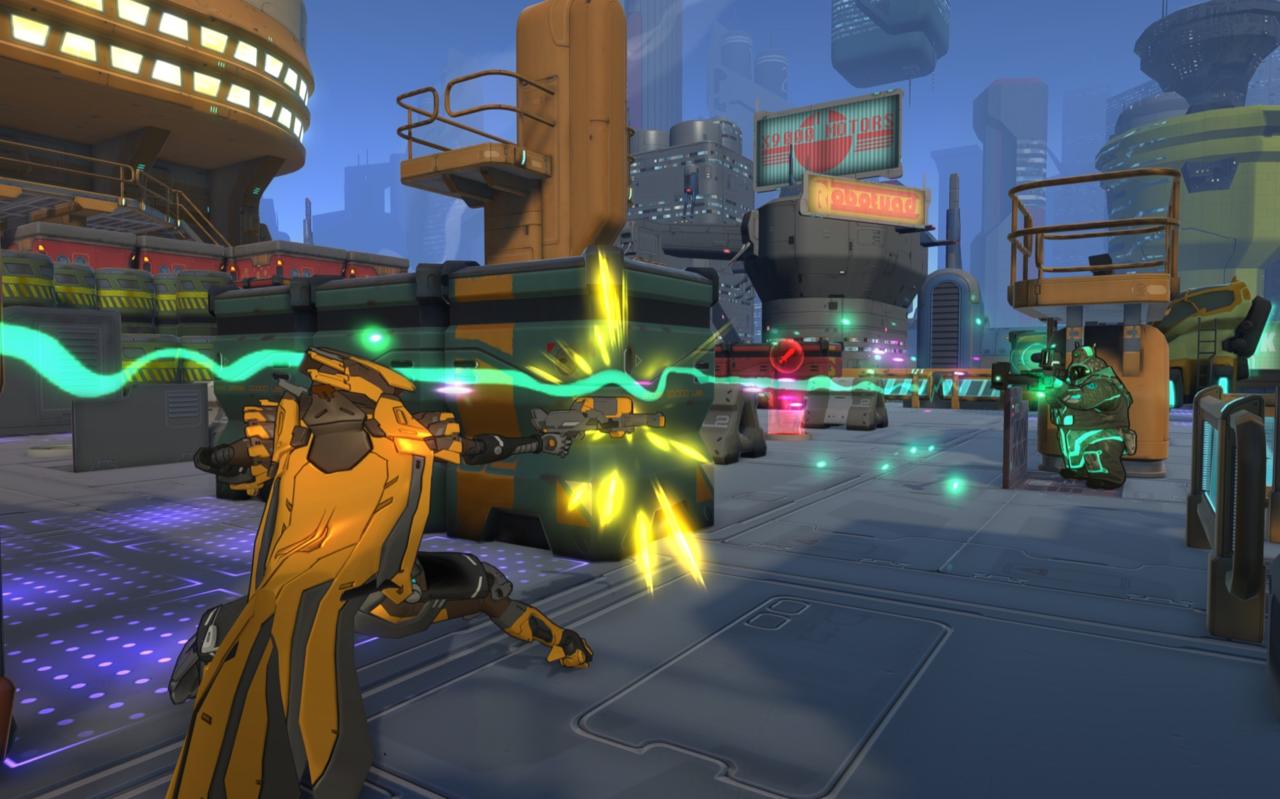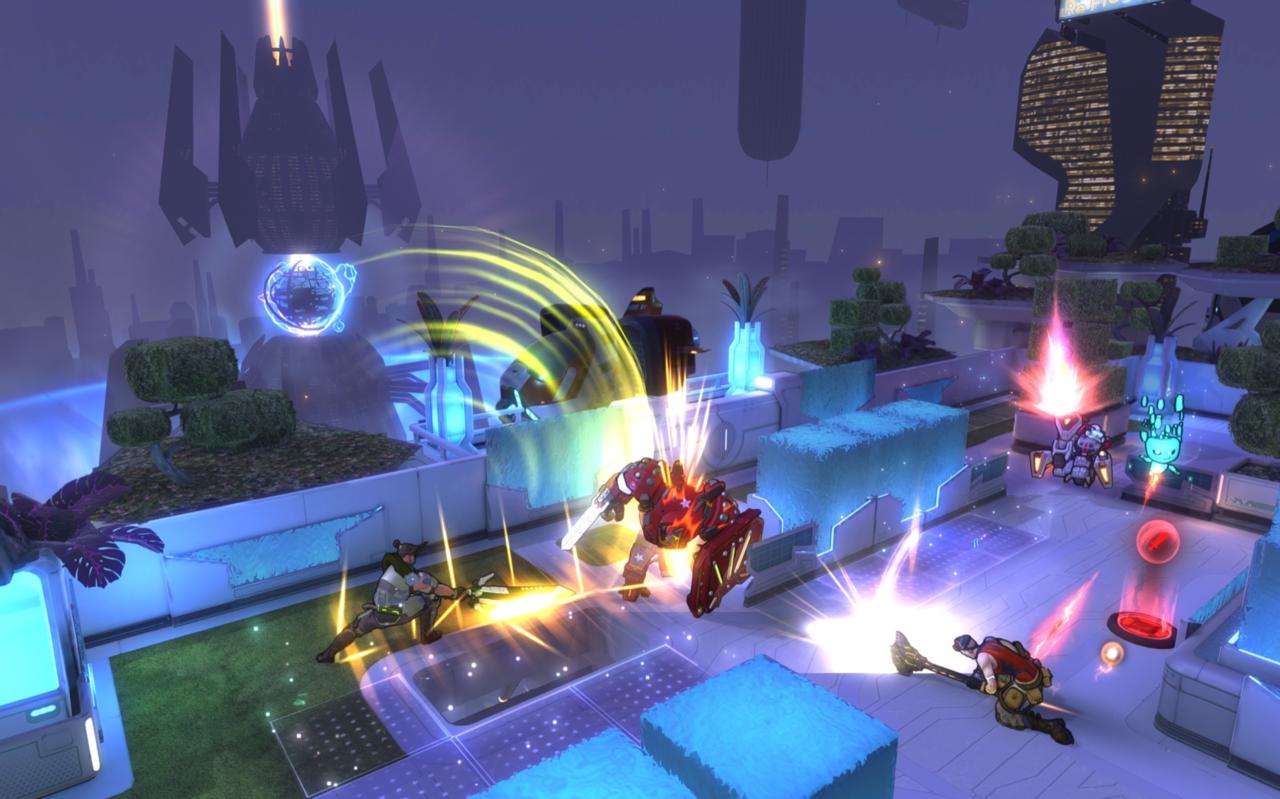"Checkmate," I typed in chat, just as the my beefy warrior hero Titus slammed down his broadsword and killed the two shooters before him. Victory and game over.
But "checkmate" is an apt enough word to use when playing this game. Atlas Reactor's cast might be filled with the likes of robo-puppies and gun-toting fishmen rather than sword-swingers or wooden pawns, but watching a match feels much like watching the ancient game of chess. It retains this feeling even with a host of influences--a bit of XCOM here, a dash of League of Legends there--and a multiplayer focus that pits two teams of four players against each other. It maintains a near-perfect balance of match length, tactics, replayability, and flow of action, and comes off as something unique and fresh.
It's also turn-based, a design choice that initially comes off a poor bedfellow for its PvP emphasis. But the greatness of Atlas Reactor is that it works, in part because there's little waiting involved. Every player gets only 20 seconds to plan and position their next moves over a gridded map, and every player does this planning phase at the same time. The action winds up right as those 20 seconds wind down, and the moves play out on the map down lanes and conveniently placed walls. And then, tick-tock, it's time to start again, and this dance plays on for either 20 total turns or until one side kills five players. And as if to prove that Atlas Reactor seriously has a thing for the number 20, most matches last no more than that many minutes, which comes as a blessing when things aren't going well.
Even with the decent tutorial, it's daunting for the first few matches. Once it kicks off, the action unfolds in a series of phases, all of which you have to account for with a library of five abilities within the space of 20 seconds. First, there's the Prep phase, which sees your hero lay down traps (or shout to weaken opponents, as my warrior Titus does). Right after that comes the Dash phase, which lets you dart out of the way if you're worried another player is about to unleash a big attack. That’s followed by the Attack phase proper, where you fire rocket launchers, unleash huge mechanical choppers, or swing greatswords depending on the hero. After all that comes the Movement phase, which lets your hero move to a new area in preparation for a new attack. Adding to the mix is a wide range of options for taking cover, power-ups for damage and health, three single-use "catalysts" for healing and short teleports, and a fog of war mechanic that lets you hide from enemies on specific tiles.
Spelled out like that, it sounds comically unwieldy for the time allotted, but it makes sense in action. At least one of those abilities is an ultimate that can't be used unless you've amassed enough energy, and distance limitations often rule out certain abilities. At least half the time, I'd say, I'd locked in my moves before the 20-second timer even ran out.

Much as in chess, a big chunk of the fun comes from guessing how the next turn plays out. I might have Titus ready to charge at an enemy player with low health on the other side of the map, but if he or she dashes away, I could end up swatting at air when I arrive. Or maybe there's a weakened enemy who could last a bit longer by picking up that nearby health pack, but I could thwart his plans by nabbing it first. Some of the best moments come down to skillful gambling, such as betting that a couple of enemy players will dash into the catastrophic area-of-effect attack I'm about to unleash.
Communication by voice or chat interface naturally makes all this easier, although I've been in plenty of winning matches where the only words I see typed are "lol"s when massive attacks miss. Atlas Reactor is nice enough to make this process easier by automatically hooking you up with a Discord channel before each match if you choose, and voice chat does much to get the most out of those 20 seconds.
Could the game offer a bit more variety? Certainly. As it stands, it doesn't take long to learn the tricks and secrets each of the few maps present, which may be a tiny part of the reason why many random players don't bother with voice chat. And it's a world I'd like to see more of. There's even a story of sorts with lively, humorous cutscenes that's largely currently locked behind the multi-week "seasons," which unlock collectibles like banners and emblems. This is a lively, cel-shaded universe that echoes The Fifth Element and any number of other cyberpunk settings while a catchy soundtrack thumps its beats in the background, and its cast of "freelancers" look as though they could rub shoulders with the cast of Overwatch and fit right in.
There are 21 freelancers, with Juno and her twin-cannon harness being the last added for launch after months of beta. More will no doubt fill the ranks eventually, but I already admire how much the experience changes and renews itself when going from my favorite Titus to Celeste (who can steal power-ups with grappling hooks) or the cutesy Quark, who smothers friends with heals but blasts the bad guys with gamma rays. Nor is it mindless shooting--tactics figure in heavily, such as the way one freelancer can bounce laser blasts off walls and shift-clicks allow for precise maneuvers around traps. Even the progression system doesn't let things get out of hand, as it merely focuses on mods for your abilities and catalysts, with extra taunts and skins tossed in for fun.

And since Atlas Reactor espouses a buy-to-play model, you merely have to pay $30, and all this is yours. (After all the 20s, I'm surprised it's not $20.) It's a nice break from the sometimes-oppressive free-to-play model that’s defined Trion Worlds’ games lately, although if you're not ready to plunk down cash, you can use the Free Mode that switches out different heroes each week. Smartly, as with so many other things about this game, those heroes are randomized by account rather than game-wide so that you're not always seeing the same five pop up in matches. And if you ever want to jump in ranked or custom matches and open more loot crates so that it feels like more than a largely functional trial, just pay the 30 bucks.
A lot of what gets passed off as "innovation" in games these days is really better described as the successful alchemy of numerous existing styles, but rarely does this practice produce the kind of gold we find in Atlas Reactor. Sure, it could use a few more maps (and more are on the way), and its learning curve is just steep enough that it's briefly tough to see the fun on the other side, but it achieves its aims with style and flair.







